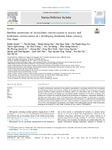Please use this identifier to cite or link to this item:
https://thuvienso.bvu.edu.vn/handle/TVDHBRVT/20391Full metadata record
| DC Field | Value | Language |
|---|---|---|
| dc.contributor.author | Đặng, Thị Hà | - |
| dc.date.accessioned | 2021-12-17T07:24:20Z | - |
| dc.date.available | 2021-12-17T07:24:20Z | - |
| dc.date.issued | 2021 | - |
| dc.identifier.uri | http://thuvienso.bvu.edu.vn/handle/TVDHBRVT/20391 | - |
| dc.description.abstract | In aquatic environments, assessment of microplastic concentrations is increasing worldwide but environments from developing countries remain under-evaluated. Due to disparities of facilities, financial resources and human resources between countries, protocols of sampling, analysis and observations used in developed countries cannot be fully adapted in developing ones, and required specific adaptations. In Viet Nam, an adapted meth odology was developed and commonly adopted by local researchers to implement a microplastic monitoring in sediments and surface waters of 21 environments (rivers, lakes, bays, beaches) of eight cities or provinces. Microplastic concentrations in surface waters varied from 0.35 to 2522 items m-3, with the lowest concentrations recorded in the bays and the highest in the rivers. Fibers dominated over fragments in most environments (from 47% to 97%). The microplastic concentrations were related to the anthropogenic pressure on the environment, pointing out the necessity in a near future to identify the local sources of microplastics. | vi |
| dc.language.iso | en | vi |
| dc.publisher | Elsevior | vi |
| dc.relation.ispartofseries | www.elsevier.com/locate/marpolbul;162(2021) | - |
| dc.subject | Lake | vi |
| dc.subject | River | vi |
| dc.title | Baseline assessment of microplastic concentrations in marine and freshwater environments of a developing Southeast Asian country, Viet Nam. | vi |
| dc.type | Article | vi |
| Appears in Collections: | CNTP-KTHH - Xây dựng (Articles) | |
Files in This Item:
| File | Description | Size | Format | |
|---|---|---|---|---|
| Dang-Ha.pdf | 3,39 MB | Adobe PDF |  Sign in to read |
Items in DSpace are protected by copyright, with all rights reserved, unless otherwise indicated.